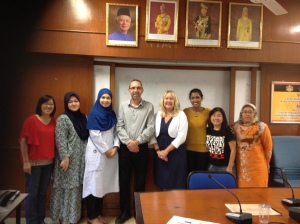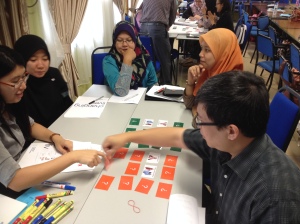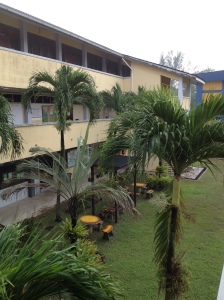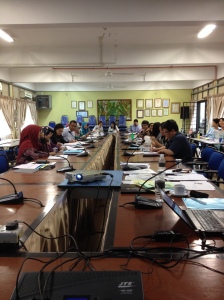By Keith Bates
Developing employment opportunities for people with disabilities is hard. I’m not sure it should be, but it is. We know that. UK employment rates remain stubbornly low. Short term funding prevails, quality of support is variable and only now are we turning our attention to working with young people while they are still at school, raising aspirations and expectations that they can and should work, Yet again we repeat, we know what works; give good quality support to people who are interesting in finding work, and we can match their skills interests and aspirations with the needs of local employers and get good job outcomes.
This was one of the key messages shared during a recent knowledge exchange and training visit to Malaysia. The team, consisting of Keith Bates and Molly Mattingly, both research partners from the Foundation for People with learning Disabilities and part of the wider Big Society Progarmme led by Professor Dan Goodly of Sheffield University and Katherine Runswick Cole of Manchester Metropolitan University
With employment rates of 7%, we cannot claim to have succeeded in the UK but we do have some pockets of promise. The impact of supported internships is an indicator what can be achieved when we develop good relationships with employers. The increasing popularity of self employment as a route to work shows that people can and do want to explore small business ownership. The emergence of quality standards for job coaches reminds us that we have a wealth of evidence about how to support people find and keep great jobs.
Concluding the visit with a two day workshop with 32 Special Education Teachers, (including one who flew in from Sabah, Borneo), Job Coaches, Employers and representatives from the Dept of Education the team shared their experience UK approaches to planning for transition, supported internships as well as detailing the rise of self employment. Held at a school in a very hazy Kuala Lumpur, the workshop involved Keith and Molly delivering presentations, introducing activities from FPLD’s When I Grow Up programme and facilitating a lively discussion about how Malaysia can build on its own transitions pilot and further support teachers to prepare young people for a working future.
Importantly the session was supported by the Prime Minister’s Office and the unit within that monitors high impact programmes. Malaysia clearly wants to get this right. We were delighted to hear our colleagues now plan to adapt some of the materials introduced for the Malaysian context and explore many more of the concepts debated.
Yet we came away from Malaysia with an overwhelming sense of familiarity. The visit consisted of a number of workshops, seminars and discussions in and outside the Government; the Ministry of Special Education, The Department of Social Welfare and with Employers. Supported Employment is gaining pace in Malaysia thanks to the work of JICA the Japan International Co-operation Agency http://www.jica.go.jp/malaysia/english/ which has been developing job coaching and equalities training across the country.
There is little doubt that huge progress has been made, and as JICA withdraw this year, Malaysia will need to embrace the changes introduced and continue to develop opportunities. We were struck by the high regard each Department placed on the employment of disabled people and the engagement of many key players.
The inclusion of families and of disabled people themselves is vital as it is in the UK. Similarly, calls to address the need to uphold quality and provide a focus may prove beneficial. This is familiar territory. We know what works, but like our colleagues in Malaysia will no doubt echo, systemic change is a long game.



